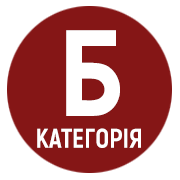GENERIC COMPETENCES IN THE FOCUS OF LARGE-SCALE INTERNATIONAL RESEARCH
DOI:
https://doi.org/10.32782/2410-2075-2024-19.3Keywords:
generic competences, universal competences, transversal competences, key competencesAbstract
Introduction. An important condition for the sustainable development of modern society is the modernization of the higher education system, taking into account the world research heritage. Among the urgent issues that are addressed to the modernization of the education of Ukraine is the overcoming the gap between the higher education system and the labor market by predicting and developing from higher education applicants for such competences that would enable them to be successfully realized not only in professional life but also all other areas of life. The definition and systematization of generic (universal) competences was dealt with a number of large-scale international research projects, the results of which have become a valuable basis for many subsequent scientific explorations, a source of interesting ideas for scientists of different fields of knowledge, including pedagogical one. Purpose. The purpose of the article is to analyze the list of generic competences, indicated by the results of the Tyunging project, which is used in Ukraine for the development of standards of higher education, with the lists (catalogs) of universal competences produced by the results of other large-scale international studies. Methods. To achieve this purpose, a set of methods was used: analysis, synthesis, comparison, systematization, generalization of theoretical material. Results. The article analyzes the approaches used to identify generic (universal) competences in the organization and conduct of large-scale international research and lists the competences under the study, produced by the results of analyzing projects. The article makes the analysis of the obtained results of comparison of the list of generic competences, indicated by the results of the Tyunging project, which is used in Ukraine for the development of standards of higher education, with the lists (catalogs) of universal competences produced by the results of other large-scale international studies. Originality. Scientific relevance is connected with the analysis of the results of comparing the lists of universal competences (by the number of competences determined, their name and their ranking), distinguished by the results of the Tyunging project, which is used in Ukraine for the development of higher education standards, with lists (catalogs) of other large-scale international researches. Conclusion. An overview of large-scale international researches is presented, the subject of scientific knowledge of which was universal competences, indicates the importance of studying such competences, recognized at the world level. Obtained at different stages of large-scale projects, the results remain relevant today, they testify to the evolution of scientific thought about the identification and development of universal competences, determining the role of such competences in the life of the individual and society as a whole, finding ways of optimal formation of generic competence approach, etc. Based on the fact that modern education is designed not only to respond to the urgent requests of society, but also to be prognostic, in particular in the issue of separation and development of generic competences and guided by the fact that the methodological recommendations for the development of higher education standards (2020) indicate that the list of generic competences, distinguished by the results of the EU Tyunging, is open, it is worth, in our opinion, when developing an educational, educational-scientific and research trajectory to take into account the approaches determined by the results of other large-scale international research projects regarding the identification, systematization and ranking of generic competences.
References
Борова Т.А., Ведь Т.М, Чжанг Ц. Формування трансверсальних компетентностей у студентів ЗВО на основі гібридного навчання. Електронне наукове фахове видання «Адаптивне управління: теорія і практика». Серія «Педагогіка». 2022. № 13(25). DOI: https://doi.org/10.33296/2707-0255-13(25)-07.
Вступне слово до Проекту Тьюнінг – гармонізація освітніх структур у Європі. Внесок університетів у Болонський процес. Tuning Project. 2006. URL: https://uu.edu.ua/upload/universitet/normativni_documenti/General_Brochure_Ukrainian_version.pdf (дата звернення: 15.08.24).
Дерстуганова Н.В. Ґенеза змісту поняття «компетентність» в українському та зарубіжному освітньому дискурсі. Педагогіка формування творчої особистості у вищій і загальноосвітній школах. 2022. № 82. С. 169–173. DOI: https://doi.org/10.32840/1992-5786.2022.82.30.
Дерстуганова Н.В. Поняттєве розмежування категорій «компетентність» і «компетенція» у контексті підготовки здобувачів ступеня доктора філософії. Перспективи та інновації науки (Серія «Педагогіка», Серія «Психологія», Серія «Медицина»). 2022. № 8(13). С. 45–56. DOI: https://doi.org/10.52058/2786-4952-2022-8(13)-45-56.
Дерстуганова Н.В. Сутність поняття «загальні компетентності» у вітчизняній науковій парадигмі. Педагогіка формування творчої особистості у вищій і загальноосвітній школах. 2022. № 84. С. 158–162. DOI: https://doi.org/10.32840/1992-5786.2022.84.27.
Дерстуганова Н. В. Сучасний стан термінологічного апарату компетентнісного підходу: поняття «загальні компетентності» та його синоніми. Засоби навчальної та науково-дослідної роботи. 2024. № 62. С. 21–31. DOI: https://doi.org/10.34142/2312-1548.2024.62.02.
Олефіренко Т., Попова Л. Формування трансверсальних компетентностей у процесі становлення професійної ідентичності майбутнього педагога. Збірник наукових праць. Педагогічні науки. 2022. № 99. С. 45–51. DOI: https://doi.org/10.32999/ksu2413-1865/2022-99-7.
Про вищу освіту : Закон України від 01.07.2014 р. № 1556-VII. URL: https://zakon.rada.gov.ua/laws/show/1556-18#Text (дата звернення 15.08.24).
Про внесення змін до Методичних рекомендацій щодо розроблення стандартів вищої освіти : Наказ МОН України від 30.04.2020 р. № 584. URL: https://mon.gov.ua/npa/pro-unesennya-zmin-dometodichnih-rekomendacij-shodo-rozroblennya-standartiv-vishoyi-osviti-1 (дата звернення 15.08.24).
Семеног О.М., Попова О.А., Кондрицька О.І. Трансверсальні компетентності у вимірах партнерської взаємодії: викладач і здобувач вищої освіти. Академічні студії. Серія «Педагогіка». 2021. № 3, ч. 1. С. 111–120. DOI: https://doi.org/10.52726/as.pedagogy/2021.3.1.17.
Ткаченко Н., Юань В. До проблеми формування трансверсальних компетентностей майбутніх викладачів вишів у процесі їх підготовки на третьому рівні вищої освіти. Наукові інновації та передові технології. 2023. № 10(24). С. 718–731. DOI: https://doi.org/10.52058/2786-5274-2023-10(24)-718-731.
Catalogue of Transversal Competences. Key for Employability. 2016. URL: https://www.keystart2work.eu/images/docs/o2-catalogue/O2_Catalogue_EN.pdf (дата звернення: 15.08.24).
Definition and Selection of Competencies (DeSeCo): Theoretical and Conceptual Foundations. Strategy paper an overarching frame of reference for a coherent assessment and reseach program on key competencie. 2002. URL: https://www.deseco.ch/bfs/deseco/en/index/02.parsys.34116.downloadList.87902. DownloadFile.tmp/oecddesecostrategypaperdeelsaedcericd20029.pdf (дата звернення: 15.08.24).
ERI-Net Asia-Pacific Regional Policy Series 2014 Regional Study on Transversal Competencies in Education Policy and Practice (Phase II). School and Teaching Practices for Twenty-first Century Challenges: Lessons from the Asia-Pacific Region. 2016. UNESCO. URL: https://unesdoc.unesco.org/ark:/48223/pf0000244022?posInSet=2&queryId=N-EXPLORE-f2183518-9d46-40df-9d20-f89958616ee3 (дата звернення 15.08.24).
The Definition and Selection of Key Competencies. Executive Summary. 2005. URL: https://www.oecd.org/education/skills-beyond-school/definitionandselectionofcompetenciesdeseco.htm (дата звернення 15.08.24).
Transversal Competencies In Education Policy And Practice (Phase I) Regional Synthesis Report. 2013 Asia-Pacific Education Research Institutes Network (ERI-Net). 2015. UNESCO. URL: https://unesdoc.unesco.org/ark:/48223/pf0000231907?posInSet=1&queryId=b049b9c7-4a40-4228-911e-7e9c19521eba (дата звернення 15.08.24).
TVETipedia Glossary. URL: https://unevoc.unesco.org/home/TVETipedia+Glossary/lang=en/show=char/char=num#start (дата звернення 15.08.24 р.).







